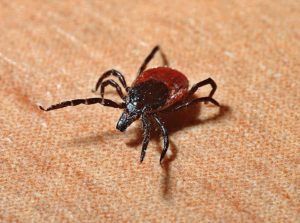
Ticks-2022 Season is about upon us! New Ticks & New Diseases.
Ticks are on the rise worldwide at alarming rates. The numbers of ticks are increasing, tick-borne diseases are on the rise, ticks are being found in new and far reaching regions, and new species of ticks keep being discovered!
One line of thought is that global warming may be a contributing factor to the pandemic (as if one pandemic at a time wasn’t enough!) rise of ticks.

As reported by the CDC: From 2004 through 2016 A total of 642,602 cases of disease caused by the bite of an infected mosquito, tick, or flea were reported in the U.S.
The number of reported tickborne diseases more than doubled in 13 years and accounted for more than 60 percent of all reported mosquito-borne, tick-borne, and flea-borne disease cases. Diseases from ticks vary from region to region across the U.S. and those regions are expanding.
50 states have now had residents test positive for Lyme disease.
Lyme disease is a bacterial infection that can cause a wide variety of symptoms, including joint aches, fatigue, facial palsy, neck stiffness, and possibly death.
Lyme disease is now the most commonly reported vector-borne illness in the United States. In 2015, it was the only the sixth most common Nationally Notifiable disease.
Important note of interest: In only one hours’ time a biting tick can transmit potentially fatal diseases to its host.

Prevention is key where tick-borne diseases are concerned, especially if you live on the east coast, says Dr. Joyce Harman in an informative article about not letting your guard down around ticks.
If your horse is suspected of possibly having a tick-borne disease there is a wonderful herbal product available that may help to naturally support the equine immune system called Tic X.
Two of the other rather common diseases now being found in the U.S. are Rocky Mountain Spotted Fever and ehrlichiosis.
Rocky Mountain spotted fever is the deadliest of tick-borne diseases. The initial symptoms mimic the flu, but generally degrade into neurological dysfunctions. Most affected with RMSF will fully recover without any long-term disabilities. However, a delay in diagnosis and treatment is contributory to the higher rates of complications and mortality. With flu like symptoms it might be easy to have a delayed diagnosis.
Ehrlichiosis occurs from the bite of a Lone Star tick. While some cases of ehrlichiosis are mild, the disease can be severe or fatal if not treated correctly, even in previously healthy people. Again, the symptoms may mimic so many other common ailments. Runny nose, fever, chills, stomach upset and difficulty breathing. Another symptom for humans, that often never goes away, is a severe allergy to meat.
And as if this wasn’t scary enough…
Another new tick species has been found in the U.S. known as the Asian Longhorned tick. Asian ticks are relatively new to the U.S., but they are spreading at alarming rates.
This tick species gorges on so much blood it kills itself, and it can lay up to 2,000 eggs at one time with no male ticks even needed. Asian ticks are known to cling to hosts in high numbers and can literally kill pets, livestock and wildlife.
How do you protect your horses from tenacious ticks?

First off keep your pastures and turnouts cleared of weeds and shrubs. Carefully check all your animals from head to toe for ticks on a regular basis. Consider using safe and natural pest prevention products. You can find many listed in the Healthy Horse Holistic Handbook.
When heading out for a ride in areas that may have ticks, a great option for horses (and dogs) is Tickskick. Tickslick is not a repellent, but rather a tick deflective spray that is naturally effective without toxic chemicals.
Now, more than ever before, it is imperative to be informed and proactive for your health and your pets health. The old adage An Ounce of Prevention is Worth a Pound of Cure could not be truer than in regards to safely protecting your pets from ticks!
Disclaimer: Tickslick, nor any third party associated with, related to, or linked to their businesses or websites, expressly disclaims any responsibility for, and makes no representations or warranties regarding, any statement, information, materials, or content found on or included in Tickslick’s marketing materials/websites, or any third party marketing materials/websites related to, associated with or linked to Ticks-Off’s business or website. Tickslick’s website and blogs are not intended to diagnose or treat any health conditions. They are meant solely for informational purposes. Please seek veterinary advice for any health concerns or problematic conditions. These statements have not yet been approved by the FDA.
